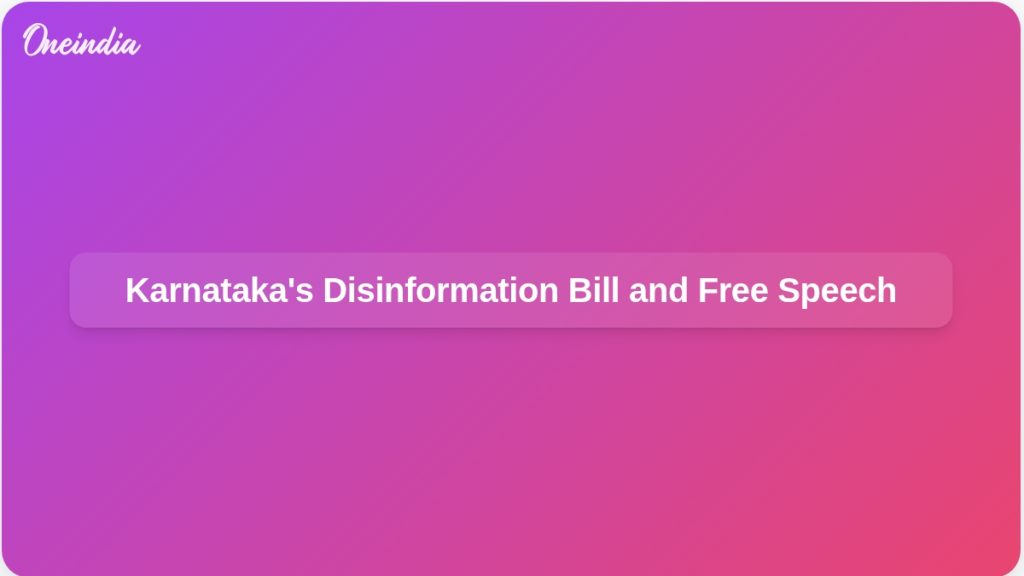Listen to the article
Karnataka is preparing to introduce a groundbreaking bill aimed at curbing the spread of false information while preserving free speech. The proposed Karnataka Disinformation Bill, announced by IT/BT Minister Priyank Kharge, seeks to address growing concerns about misinformation, disinformation, malinformation, and fake news in the digital age.
The legislation is expected to be introduced during the Karnataka Assembly’s winter session in Belagavi this December, marking one of the first state-level attempts in India to tackle the complex issue of digital falsehoods.
“We do not intend to curtail free speech, creativity, satire, or opinions,” Kharge emphasized during his address at the Policy Dialogue on Truth, Trust and Technology event jointly organized by Ikigai Law and the National Law School of India University (NLSIU). “Our goal is to identify and hold accountable those who deliberately spread falsehoods that can harm individuals or society.”
The minister highlighted how technological advancements have dramatically amplified the potential dangers of disinformation. With artificial intelligence tools becoming increasingly accessible and affordable, the creation of deepfake videos, voice clones, and fabricated documents has become remarkably simple, allowing false information to appear convincingly authentic.
“Today, a single click has the power to trigger widespread chaos,” Kharge warned, pointing to several recent incidents where manipulated content led to real-world consequences. This escalating threat landscape underscores the urgent need for regulatory frameworks that can address both the creators of misleading content and the platforms that facilitate its spread.
The proposed legislation aims to establish a balanced approach to content moderation. It will distinguish between genuine opinions and deliberate falsehoods, focusing enforcement measures on content designed to deceive rather than legitimate expression. This distinction is crucial for maintaining Karnataka’s vibrant digital economy while protecting citizens from harmful misinformation.
Platform accountability forms a central component of the proposed bill. Kharge argued that digital platforms enabling the dissemination of disinformation bear indirect responsibility for its consequences. While acknowledging the challenges platforms face in monitoring vast amounts of user-generated content, the minister emphasized the need for alignment with national laws under a unified regulatory framework.
“Platforms must honor their own public policies and community standards,” Kharge stated. “When they fail to enforce their own rules consistently, it creates space for harmful content to flourish.”
Industry experts have noted that Karnataka’s position as India’s technology hub gives this legislative effort particular significance. The state hosts offices for numerous global technology companies and startups, making it an influential testing ground for digital regulation approaches that could eventually inspire national policies.
The proposed bill comes amid growing global concern about the impact of digital misinformation on democratic processes, public health, and social cohesion. Several countries, including Singapore with its Protection from Online Falsehoods and Manipulation Act and Germany with its Network Enforcement Act, have already implemented laws addressing similar concerns.
Critics of such legislation often raise concerns about potential overreach and the subjective nature of determining what constitutes false information. However, Kharge has emphasized that the Karnataka bill will include robust safeguards to prevent misuse and ensure legitimate expression remains protected.
The minister has invited stakeholders, including technology companies, civil society organizations, and legal experts, to contribute to the development of the legislation before its introduction in December.
As artificial intelligence and content manipulation technologies continue to advance, Karnataka’s approach to balancing free expression with protection against harmful falsehoods will likely serve as a significant case study for other Indian states and potentially for national policy discussions.
Fact Checker
Verify the accuracy of this article using The Disinformation Commission analysis and real-time sources.




16 Comments
Interesting to see Karnataka taking the lead on this issue. Disinformation is a global challenge, so it will be valuable to learn from their experience.
Agreed, this could set an important precedent for other states and countries grappling with similar concerns.
I’m curious to understand more about the specific types of falsehoods they aim to target. The definitions and scope will be important details to watch.
Yes, the nuances around what constitutes actionable disinformation versus protected speech will be crucial.
The growing threat of disinformation, fueled by AI tools, is a real challenge that many governments are grappling with. This proactive approach by Karnataka is encouraging to see.
Yes, the ability to cheaply produce convincing fake content is concerning. Striking the right balance will be crucial.
This bill seems to strike an interesting balance – combating harmful falsehoods while preserving free speech. It will be important to see the details on how they define and enforce this without overreach.
Absolutely, the implementation will be critical. Protecting free expression while curbing malicious disinformation is a delicate act.
I’m curious to see the specifics of how they plan to identify and hold accountable those deliberately spreading falsehoods. The definitions and processes will be key.
Agreed, the devil will be in the details. Transparency and clear guidelines will be essential to prevent overreach or abuse.
Combating disinformation is essential, but preserving free expression is also a fundamental right. Striking the right balance will be no easy task.
Absolutely, it’s a complex challenge that will require careful consideration of various interests and rights.
It’s good to see a state-level attempt to address this issue in India. Disinformation is a growing global concern that requires multi-faceted solutions.
Yes, a patchwork of different approaches at various levels may ultimately be needed to tackle this complex problem effectively.
Preserving free speech while limiting malicious falsehoods is a delicate balance. I hope Karnataka can find an approach that withstands legal scrutiny.
Absolutely, the courts will likely play a key role in shaping how this law is interpreted and applied over time.